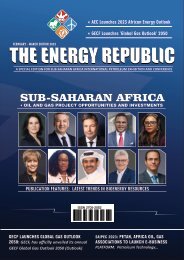OGR July - August Edition 2020
This publication provides latest stories in Africa, COVID-19 Pandemic in Africa, and key recommendation from industry experts on how Africa can navigate through the global pandemic.
This publication provides latest stories in Africa, COVID-19 Pandemic in Africa, and key recommendation from industry experts on how Africa can navigate through the global pandemic.
Create successful ePaper yourself
Turn your PDF publications into a flip-book with our unique Google optimized e-Paper software.
TOP STORY
of new opportunities.
The African Energy Chamber and the IAGC
have recommended several mitigating
measures on behalf of the oil and gas
industry to ensure sustainability in
response to the ongoing COVID-19
pandemic in
Africa. These measures are intended to
mitigate the expected loss of jobs and
abandonment of erstwhile viable projects
in the African oil and gas sector in the face
of a global recession.
In their words, they said that, While African
oil producers might not be able to change
the current market and global health
dynamics individually, they have the ability
as regulators to positively influence the
business environment in their respective
countries with innovative policies.
They called on African governments to take
swift action to ensure stability in the
African oil and gas industry, especially in the
geophysical & exploration (G&E) subsector,
to maintain a pipeline of projects
that will maintain or even increase output
levels. Such key demands and measures
include waiving taxes on service companies
for six months; waiving withholding taxes,
especially for not resident companies, for
six months; urging banks to provide no
interest loans and loan guarantees for local
service companies with ongoing projects
with IOCs; granting extensions on all
exploration projects for 24 months;
extending the non-exclusive geophysical
data confidentiality periods to a minimum
of 15 years where such is not already in
place; waiving part of the work project
commitments for exploration companies;
setting up and implement government and
private sector discussions on revising some
of the fiscal terms in the PSC that make it
difficult for explorers to meet commitments
in today's market environment and aid
capital fundraising; cutting in half (50%)
fees due to the state like training funds,
surface rental, social projects etc.; bring
champions of the industry by encouraging
various farm-in and farm-out discussions
on current licenses; ensuring state backing
on midstream projects so FID's are not
cancelled; making diversification of the
economy a priority; looking at local content
measures that are not working and try to
encourage or implement a more regional
African content approach; and considering
cutting departmental spending and
reduction of unnecessary travel
expenditure.
"As the voice of the African Energy industry
and it is at the core of our mandate to fight
for the comeback of the African Energy
industry post-COVID-19 and the price war
by making practices on how to navigate the
current crisis. We are bullish by the
response so far from many African oil
producers that include adopting some of our
proposals above. However, we call for
everyone to continue doing more. Our
American friends from the IAGC have been
a strong and steadfast ally in helping us
make a case for Africa and its energy sector"
said NJ Ayuk, Executive Chairman of the
African Energy Chamber.
On her part, Ms. Nikki Martin, President of
the IAGC highlighted the importance of the
geophysical and exploration (G&E)
industries in maintaining a stable energy
industry. "National Authorities should be
working to maintain expected timelines for
licensing rounds, including all review
periods and award announcements which
contribute to business certainty and a stable
pipeline for future oil production. Energy
security for the continent will only be
ensured with continued exploration," she
said. "The G&E industry provides the key to
unlocking energy resources that will allow
for rebuilding economies when the COVID-
19 virus has run its course, however, to
rebuild, there must be a viable energy
industry when that time comes."
More interesting, some African countries
are already offering tax reliefs and fiscal
packages to companies to mitigate any
adverse impacts on exploration and
production activities in their countries. For
instance, the Government of Equatorial
Guinea has moved on to grant tax reliefs for
services companies in the country. The
Government took this action to support oil
& gas services companies in the country as
part of its response to the oil price drop
caused by the coronavirus pandemic.
The Ministry of Mines and Hydrocarbons,
H.E. Gabriel Mbaga Obiang Lima, said that
the unanimous decision to waive its fees for
services companies will last for a period of
three months.
In another development, Oneyka Ojogbo,
Associate Attorney at Centurion Law Group
pointed out that the current market
situation has extremely affected companies
as they are now faced with a myriad of
financial issues that have led to force
majeure on projects.
She stressed that for companies to mitigate
all associated risks on contracts and local
operations, they have to reconsider and
take all necessary actions to reevaluate their
positions under oil contracts. IOCs and
foreign service providers may also be unable
to meet their capital spending commitments
due to production cuts which could affect
their ability to meet up with repayment
obligations under financing instruments.
She advised companies to review all
contracts including the terms and condition
such as Capex Commitment in Joint Venture
or Production Sharing Contracts, other
financial instruments in a post-COVID-19
recovery, political and economic stability in
the host country, policies that affect the
stability of the current contract, local
content obligations, and the overall cost of
t h e p r o j e c t b e f o r e m a k i n g a n y
commitments.
Concerning Employment contracts, Oneyka
Ojogbo underscored the need for
companies to consider their current
employment regulations and ensure strict
compliance.
Oneyka Ojogbo
It may be illegal to terminate
the employment contract at
this point but the company
should consider the option of
“Furlough.
“It is important to discuss with labor experts
in the country and closely monitor the
proclamations of the authorities for any
changes in laws or regulation affecting
labor”
Across oil & gas basins, drilling projects are
being put back on the shelves or terminated
due to the ongoing Coronavirus Pandemic.
The oil and gas industry will only work for
Africans when there are fair policies and an
enabling environment that will treat oil and
gas companies as partners who drive
progress in the region. And, this is why
industry experts are advocating for
measures that will support the continuity of
business operations and future sector
growth. They strongly advocate for tax
relief on services companies, reforms of
upstream fiscal regimes, banking and
financial support, regional content
development, incentives to infrastructure
projects, and bold actions on removing fuel
subsidies.
“We have the tools in our
hands to quickly open new
markets for our oil and gas
businesses and create new
jobs for our continent."
39
OIL AND GAS REPUBLIC I SPECIAL EDITION















